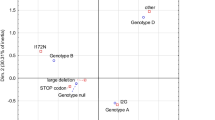Abstract
More than 95% of congenital adrenal hyperplasia (CAH) cases are associated with mutations in the 21-hydroxylase gene (CYP21A2) in the human leukocyte antigen (HLA) class III area on the short arm of chromosome 6p21.3. In the diagnosis of 21-hydroxylase deficiency, CYP21A2 genotyping is a valuable complement to biochemical investigations. Genotyping can confirm the diagnosis (or carrier state) and, at the same time, provide accurate phenotype prediction in patients carrying severe mutations. In addition, the use of genetic testing is also helpful in prenatal diagnosis where the goal of prenatal treatment is preventing genital virilization of the female fetus. An in-depth knowledge of CYP21A2 genetics is essential to assure the correct interpretation of results obtained. To date, more than 200 small pathogenic variants of the CYP21A2 gene have been reported, showing good agreement between clinical phenotype and patient genotype. Recently, novel CYP21A2 deletions, involving one or more exons, have been reported in different populations. Since these rearrangements have never been described before in the genetic history of 21-hydroxylase deficiency, these new deletions have aroused particular interest. However, it is possible that these novel rearrangements are the result of incorrect interpretation of multiplex ligation-dependent probe amplification (MLPA).


Similar content being viewed by others
References
Arlt W, Willis DS, Wild SH, Krone N, Doherty EJ, Hahner S, et al.; United Kingdom Congenital Adrenal Hyperplasia Adult Study Executive (CaHASE). Health status of adults with congenital adrenal hyperplasia: a cohort study of 203 patients. J Clin Endocrinol Metab. 2010;95:5110–21.
Gidlöf S, Falhammar H, Thilén A, von Döbeln U, Ritzén M, Wedell A, et al. One hundred years of congenital adrenal hyperplasia in Sweden: a retrospective, population-based cohort study. Lancet Diabetes Endocrinol. 2013;1:35–42.
Parsa AA, New MI. Steroid 21-hydroxylase deficiency in congenital adrenal hyperplasia. J Steroid Biochem Mol Biol. 2017;165(Pt A):2–11.
Simonetti L, Bruque CD, Fernández CS, Benavides-Mori B, Delea M, Kolomenski JE, et al. CYP21A2 mutation update: comprehensive analysis of databases and published genetic variants. Hum Mutat. 2018;39:5–22.
Koppens PF, Hoogenboezem T, Degenhart HJ. Carriership of a defective tenascin-X gene in steroid 21-hydroxylase deficiency patients: TNXB–TNXA hybrids in apparent large-scale gene conversions. Hum Mol Genet. 2002;11:2581–90.
Concolino P, Mello E, Minucci A, Giardina B, Capoluongo E. Genes, pseudogenes and like genes: the case of 21-hydroxylase in Italian population. Clin Chim Acta. 2013;424:85–9.
New MI, Abraham M, Gonzalez B, Dumic M, Razzaghy-Azar M, Chitayat D, et al. Genotype-phenotype correlation in 1,507 families with congenital adrenal hyperplasia owing to 21-hydroxylase deficiency. Proc Natl Acad Sci USA. 2013;110:2611–6.
Mohamed S, El-Kholy S, Al-Juryyan N, Al-Nemri AM, Abu-Amero KK. A CYP21A2 gene mutation in patients with congenital adrenal hyperplasia. Molecular genetics report from Saudi Arabia. Saudi Med J. 2015;36:113–6.
Liu J, Zhang X, Zhang H, Fang L, Xu J, Guan Q, et al. Identification of a novel compound heterozygous mutation of the CYP21A2 gene causing 21-hydroxylase deficiency in a Chinese pedigree. Mol Med Rep. 2018;17:4265–72.
Chi DV, Tran TH, Nguyen DH, Luong LH, Le PT, Ta MH, et al. Novel variants of CYP21A2 in Vietnamese patients with congenital adrenal hyperplasia. Mol Genet Genom Med. 2019;27:e623.
Concolino P, Costella A. Congenital adrenal hyperplasia (CAH) due to 21-hydroxylase deficiency: a comprehensive focus on 233 pathogenic variants of CYP21A2 gene. Mol Diagn Ther. 2018;22:261–80.
Concolino P, Mello E, Zuppi C, Capoluongo E. Molecular diagnosis of congenital adrenal hyperplasia due to 21-hydroxylase deficiency: an update of new CYP21A2 mutations. Clin Chem Lab Med. 2010;48:1057–62.
Concolino P, Mello E, Toscano V, Ameglio F, Zuppi C, Capoluongo E. Multiplex ligation-dependent probe amplification (MLPA) assay for the detection of CYP21A2 gene deletions/duplications in congenital adrenal hyperplasia: first technical report. Clin Chim Acta. 2009;402:164–70.
Concolino P, Mello E, Minucci A, Zuppi C, Capoluongo E. Multiplex ligation-dependent probe amplification analysis is useful for diagnosing congenital adrenal hyperplasia but requires a deep knowledge of CYP21A2 genetics. Clin Chem. 2011;57:1079–80.
Kharrat M, Tardy V, M’Rad R, Maazoul F, Jemaa LB, Refaï M, et al. Molecular genetic analysis of Tunisian patients with a classic form of 21-hydroxylase deficiency: identification of four novel mutations and high prevalence of Q318X mutation. J Clin Endocrinol Metab. 2004;89:368–74.
Lee HH. Mutational analysis of CYP21A2 gene and CYP21A1P pseudogene: long-range PCR on genomic DNA. Methods Mol Biol. 2014;1167:275–87.
Author information
Authors and Affiliations
Corresponding author
Ethics declarations
Conflict of interest
Paola Concolino has no conflicts of interest to declare.
Funding
No funding was received for the preparation of this article.
Rights and permissions
About this article
Cite this article
Concolino, P. Issues with the Detection of Large Genomic Rearrangements in Molecular Diagnosis of 21-Hydroxylase Deficiency. Mol Diagn Ther 23, 563–567 (2019). https://doi.org/10.1007/s40291-019-00415-z
Published:
Issue Date:
DOI: https://doi.org/10.1007/s40291-019-00415-z




